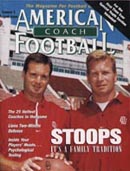AMERICAN FOOTBALL MONTHLY THE #1 RESOURCE FOR FOOTBALL COACHES
Article CategoriesAFM Magazine
|
Star's Trek...The top 25 HOT coaches who will get the best job openings in the country.© More from this issue Just as James T. Kirk passed the baton to Jean-Luc Picard, Bob Stoops, Brian Billick and Chris Palmer have now ascended to the heights of the coaching world and the time has come for the next wave of "hot" superstars on the rise. The following is our look at the 25 coaches who are sure to be on the list of every athletic director or general manager looking for a savior for his or her program. These men will inspire confidence in the faithful and rally the troops because they are the next Tommy Bowden or Bill Walsh. From college football: Al Borges, offensive coordinator, UCLA In 1998, no team was more explosive than the UCLA Bruins (5th in scoring with 40.5 points per game, and 15th in total offense 482.6 yards per game). In fact, were it not for a Swiss cheese defense, this team would have played Tennessee for ....The full article can only be seen by subscribers.
|
|
|||||||
| HOME |
MAGAZINE |
SUBSCRIBE | ONLINE COLUMNISTS | COACHING VIDEOS |
Copyright 2025, AmericanFootballMonthly.com
All Rights Reserved





